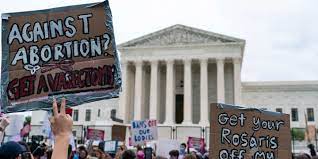Religious US conservatives push for restrictions on abortion in Africa after Roe’s demise
Sub-Saharan Africa, where women sometimes endure ridicule for becoming pregnant before marriage, has the highest prevalence of unsafe abortions and unwanted pregnancies in the whole globe.
When the U.S. Supreme Court terminated the right to an abortion nationwide a year ago, efforts to legalize abortions and make them safer in Africa were put in jeopardy. Days afterwards, President Julius Maada Bio of Sierra Leone said that his nation will legalize abortion “at a time when sexual and reproductive health rights for women are being either overturned or threatened.”
However, other American groups operating in Africa felt more confident, particularly in nations with a substantial Christian population. One is Family Watch International, a nonprofit, Christian conservative organisation whose “intense focus on Africa” and anti-LGBTQ+ positions led to its identification as a hate group by the Southern Poverty Law Center.
A “family values and sovereignty” summit with MPs and other delegates from more than 20 African nations was organized in April with the assistance of Family Watch International at the presidential offices in Uganda. The organization’s head for Africa is also pushing for Ethiopia to rescind a 2005 legislation that increased access to abortion and significantly decreased maternal mortality.
“It’s kind of like the gloves are off,” said Sarah Shaw, head of advocacy at MSI Reproductive Choices, a global supplier of reproductive health services, in an interview.
Sharon Slater, head of Family Watch International, said that donor nations were trying a “sexual social recolonization of Africa” by sneaking in legal abortion along with sex education and LGBTQ+ rights in a lecture she gave to the African Bar Association in September.
“Sexual rights activists know if they can capture the hearts and minds of Africa’s children and indoctrinate and sexualize them, they will capture the future lawyers, teachers, judges, politicians, presidents, vice presidents, and more, and they will thus capture the very heart of Africa,” Slater asserted.
The president of Malawi, a former figurehead of the Pentecostal Assemblies of God organization, attended her lecture there.
The U.S.-based Catholic organization Human Life International informed its supporters in March that “thanks to you, Malawi is safe from legal abortion” after successfully urging legislators in the country of southern Africa not to take up a measure that would have permitted abortion in certain situations.
In circumstances of rape, incest, when the mother’s life or the life of the baby is in danger, or when the mother’s physical or mental health is in jeopardy, the African Union acknowledged the right to abortion two decades ago.
More and more nations now have comparatively lenient abortion legislation. Although Nigeria, the most populous nation in Africa, only permits abortion when it is necessary to save the mother’s life, Benin allowed the procedure less than a year before the U.S. Supreme Court decision.
Events in the United States, according to African experts, might undo progress made in expanding access to safe abortion methods, particularly because the United States government is the biggest foreign giver of aid for reproductive health.
According to the Guttmacher Institute, a global research and policy organization with its headquarters in New York, such reforms might have a significant impact on the lives of women of reproductive age in sub-Saharan Africa, where it is estimated that 77% of abortions, or more than 6 million a year, are unsafe.
The World Health Organization said last year that unsafe abortions account for 16% of maternal fatalities in the area, which is mostly in sub-Saharan Africa, “with variations across countries depending on the level of restrictions to abortion.”
Pro-lifers are particularly vocal in East Africa, where nations openly debate the problem of adolescent pregnancy while providing scant sex education and very limited access to legal abortions.
Burundi, Congo, Kenya, Rwanda, South Sudan, Tanzania, and Uganda are among the countries that make up the East African Community, which is currently debating a sexual and reproductive health policy that was submitted in 2021. A clause that would let a woman to terminate a pregnancy in circumstances of rape, incest, or imminent threat to her health has drawn criticism from certain Catholic and other conservative groups.
Despite Rwandan legislation permitting abortions in certain circumstances, the Protestant Council of Rwanda earlier this year ordered all health facilities owned by its member institutions to cease conducting them.
During a webinar on Tuesday regarding the worldwide implications of the U.S. Supreme Court ruling, Brenda Otieno, research coordinator of the Kisumu Medical and Education Trust in Kenya, said, “We are having a very strong anti-rights narrative.”
According to Otieno, abortion providers are often harassed, and Kenya established a national reproductive health policy a year ago that gave little consideration to providing safe abortion treatment.
According to a rights organization in Uganda, the topic of abortion access remains taboo, with proponents encountering prejudice even as some women turn to self-mutilation.
According to Twaibu Wamala, executive director of the Uganda Harm Reduction Network, “We’ve seen a number of people lose their lives.”
Although it is illegal to have an abortion in Uganda, a certified medical professional who deems that the mother’s life is in danger from the pregnancy may lawfully perform the procedure. However, many medical professionals only provide post-abortion treatment, which may be too costly or delivered too late to save a woman’s life due to medical issues.
The government in Ethiopia has been urged by members of the civil society to look into what they believe to be a new trend: fewer public health institutions performing abortions and more women seeking treatment after performing unsafe abortions.
The majority of foreigners who instigate anti-abortion groups in the second-most populous country in Africa, according to Abebe Sibru, the head of MSI Reproductive Choices in Ethiopia. These groups “consider the Supreme Court decision as fuel for them,” she said.







